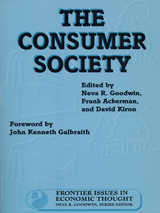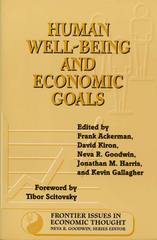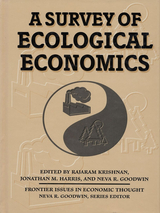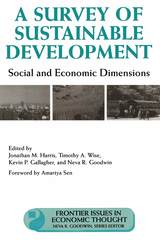

The developed countries, particularly the United States, consume a disproportionate share of the world's resources, yet high and rising levels of consumption do not necessarily lead to greater satisfaction, security, or well-being, even for affluent consumers.
The Consumer Society provides brief summaries of the most important and influential writings on the environmental, moral, and social implications of a consumer society and consumer lifestyles. Each section consists of ten to twelve summaries of critical writings in a specific area, with an introductory essay that outlines the state of knowledge in that area and indicates where further research is needed. Sections cover:
- Scope and Definition
- Consumption in the Affluent Society
- Family, Gender, and Socialization
- The History of Consumerism
- Foundations of Economic Theories of Consumption
- Critiques and Alternatives in Economic Theory
- Perpetuating Consumer Culture: Media, Advertising, and Wants Creation
- Consumption and the Environment
- Globalization and Consumer Culture
- Visions of an Alternative
The Consumer Society is an essential guide to and summary of the literature of consumption and will be of interest to anyone concerned with the deeper economic, social, and ethical implications of consumerism.

What are the ends of economic activity? According to neoclassical theory, efficient interaction of the profit-maximizing "ideal producer" and the utility-maximizing "ideal consumer" will eventually lead to some sort of social optimum. But is that social optimum the same as human well-being? Human Well-Being and Economic Goals addresses that issue, considering such questions as:
- Does the maximization of individual welfare really lead to social welfare?
- How can we deal with questions of relative welfare and of equity?
- How do we define, or at least understand, individual and social welfare?
- And how can these things be measured, or even assessed?
Human Well-Being and Economic Goals brings together more than 75 concise summaries of the most significant literature in the field that consider issues of present and future individual and social welfare, national development, consumption, and equity. Like its predecessors in the Frontier Issues in Economic Thought series, it takes a multidisciplinary approach to economic concerns, examining their sociological, philosophical, and psychological aspects and implications as well as their economic underpinnings.
Human Well-Being and Economic Goals provides a powerful introduction to the current and historical writings that examine the concept of human well-being in ways that can help us to set goals for economic activity and judge its success. It is a valuable summary and overview for students, economists, and social scientists concerned with these issues.

This accessible exploration of corporate legitimacy and crime will be important reading for advocates, journalists, students, and anyone interested in the dichotomy between law and legitimacy.
Neva Goodwin is Co-director of the Global Development and Environment Institute at Tufts University.

The emergent discipline of ecological economics is based on the idea that the world's economies are a function of the earth's ecosystems -- an idea that radically reverses the world view of neoclassical economics. A Survey of Ecological Economics provides the first overview of this new field, and a comprehensive and systematic survey of its critical literature.
The editors of the volume summarize ninety-five seminal articles, selected through an exhaustive survey, that advance the field of ecological economics and represent the best thinking to date in the area. Each two- to three-page summary is far more comprehensive than a typical abstract, and presents both the topics covered in each paper and the most important arguments made about each topic. Sections cover:
- historical perspective
- definition, scope, and interdisciplinary issues
- theoretical frameworks and techniques
- energy and resource flow analysis
- accounting and evaluation
- North-South/international issues
- ethical/social/institutional issues
A Survey of Ecological Economics is the first volume in the Frontier Issues in Economic Thought series produced by the Global Development And Environment Institute at Tufts University.

Perpetual economic growth is physically impossible on a planet with finite resources. Many concerned with humanity's future have focused on the concept of "sustainable development" as an alternative, as they seek means of achieving current economic and social goals without compromising the ability of future generations to meet their own goals. Sustainable development brings together elements of economics, public policy, sociology, ecology, resource management, and other related areas, and while the term has become quite popular, it is rarely defined, and even less often is it understood.
A Survey of Sustainable Development addresses that problem by bringing together in a single volume the most important works on sustainable human and economic development. It offers a broad overview of the subject, and gives the reader a quick and thorough guide to this highly diffuse topic. The volume offers ten sections on topics including:
- economic and social dimensions of sustainable development
- the North/South balance
- population and the demographic transition
- agriculture and renewable resources
- energy and materials use
- globalization and corporate responsibility
- local and national strategies
Each section is introduced with an essay by one of the volume editors that provides an overview of the subject and a summary of the mainstream literature, followed by two- to three-page abstracts of the most important articles or book chapters on the topic.
A Survey of Sustainable Development is the sixth and final volume in the Frontier Issues of Economic Thought series produced by the Global Development And Environment Institute at Tufts University. Each book brings together the most important articles and book chapters in a "frontier" area of economics where important new work is being done but has not yet been incorporated into the mainstream of economic study. The book is an essential reference for students and scholars concerned with economics, environmental studies, public policy and administration, international development, and a broad range of related fields.
READERS
Browse our collection.
PUBLISHERS
See BiblioVault's publisher services.
STUDENT SERVICES
Files for college accessibility offices.
UChicago Accessibility Resources
home | accessibility | search | about | contact us
BiblioVault ® 2001 - 2024
The University of Chicago Press









